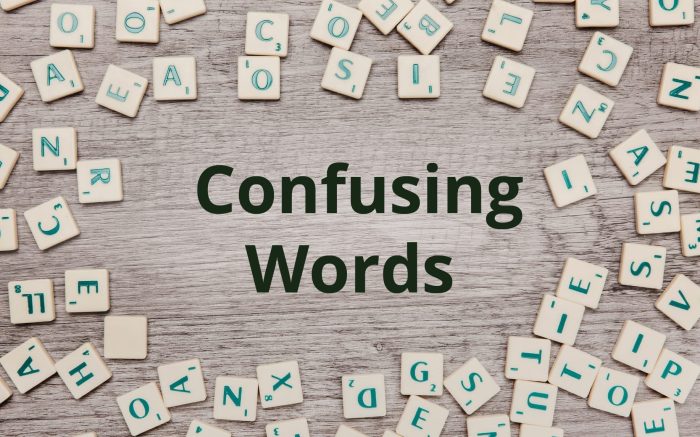کلمات گیجکننده در زبان انگلیسی – در این مطلب ما 10 تا از کلمات گیجکننده در زبان انگلیسی که با هم ممکن است اشتباه گرفته شوند را برای شما آوردهایم.

کلمات گیجکننده در زبان انگلیسی – Effect vs. Affect
Effect:
یک اسم است (کلمهای که اشیاء، افراد و ایدهها را نام میبرد). به معنای چیزی است که در نتیجه یک علت اتفاق میافتد.
- What is the effect of traffic pollution on global warming?
Affect:
یک فعل است (کلمهای که برای اعمال استفاده میکنیم). به معنای ایجاد تغییر در چیزی یا کسی است.
- The coach said that too many games affected his team’s performance.
خطای رایج این است که فعل را با اسم اشتباه میگیریم و در صورت نیاز به فعل، از اسم استفاده میکنیم یا زمانی که به اسم نیاز است، از فعل استفاده میکنیم.
Noun:
- The cold weather had a big effect on Yvette’s heating expenses. (correct)
- The cold weather had a big affect on Yvette’s heating expenses. (incorrect)
Verb:
- The cold weather affected Yvette’s heating expenses. (correct)
- The cold weather effected Yvette’s heating expenses. (incorrect)
There /ðɛ/ vs. They’re /ðɛ/ vs. Their /ðɛ/
یکی دیگر از کلمات گیجکننده در زبان انگلیسی there و they’re است.
There:
به مکانی اشاره دارد یا چیزی یا شخصی را با فعل to معرفی میکند.
- The castle is on top of that hill over there (location) یا Customers complain that there were not enough colors in the store’s summer clothing range.
:They’re
به معنی they are.
– Victoria and Zack told Ethan they’re going to the cinema.
Their:
مالکیت را نشان میدهد (که بین اشیا یا افراد ارتباط وجود دارد).
- After the long training session, the students told the PE teacher that their legs were tired.
سردرگمی زمانی اتفاق میافتد که کسی نمیداند کارکرد کلمه چیست. برای مثال، آنها ممکن است از their برای صحبت در مورد دو یا چند نفر استفاده کنند که کاری را انجام میدهند یا احساس خاصی دارند (به جای اینکه they’re هستند) یا there برای صحبت در مورد چیزی که به کسی تعلق دارد (به جای their).
- Fran and Anna say they’re ill this week. (correct)
- Fran and Anna say their ill this week. (incorrect)
- Dave and Harry said their garden needed some work. (correct)
- Dave and Harry said there garden needed some work. (incorrect)
- There is no reason why Ben can’t finish his homework on time. (correct)
- Their is no reason why Ben can’t finish his homework on time. (incorrect)
کلمات گیجکننده در زبان انگلیسی – Which vs. That:
یکی دیگر از کلمات گیجکننده در زبان انگلیسی which و that میباشد.
Which و that:
اشاره به چیزی است که قبلاً در یک جمله معرفی کرده ایم
That:
اطلاعات کلیدی چیزی را اضافه می کند، در حالی که.
Which:
وقتی جمله را حذف میکنیم، اطلاعات اضافی اضافه میکند که بر معنای اصلی جمله تأثیر نمیگذارد
- The house that Verana lives in is red, which is an unusual colour.
خطا زمانی اتفاق میافتد که افراد از which برای اطلاعات کلیدی یا that برای جزئیات بیشتر استفاده میکنند.
- The teacher said the question that the student asked was difficult to answer. (correct)
- The teacher said the question which the student asked was difficult to answer. (incorrect)
- The Easter holidays, which were late that year, were in April. (correct)
- The Easter holidays, that were late that year, were in April. (incorrect)
سردرگمی بین practise و practice از استفاده از فعل practise به جای practice اسم (یا برعکس) ناشی میشود. practise به معنای “تکرار چیزی برای بهبود” است.
- Shane practises his tennis skills five times a week.
practice به “دورههای زمانی که به طور منظم برای یک فعالیت صرف می شود تا بهبود یابد” اشاره دارد، این یک رویداد است نه یک عمل.
- Shane goes to tennis practice five times a week.
سردرگمی بیشتر زمانی ناشی میشود که در انگلیسی بریتانیایی ما از فرم / s / (practise) استفاده میکنیم، اما در انگلیسی ایالات متحده آنها فقط از فرم / c / هم برای فعل و هم برای اسم (practice) استفاده میکنند. در اینجا نمونه هایی از استفاده صحیح و نادرست از قانون بریتانیا آورده شده است:
Noun:
- The coach called Fred’s mother to see why he hadn’t come to rugby practice. (correct)
- The coach called Fred’s mother to see why he hadn’t come to rugby practise. (incorrect)
Verb:
- The teacher was happy to see all the children practising their spelling. (correct)
- The teacher was happy to see all the children practicing their spelling. (incorrect)
-
Its /ɪts/ vs. It’s /ɪts/
یکی دیگر از کلمات گیجکننده در زبان انگلیسی it’s و its است.
It’s:
کوتاه شدهی It is است. آپستروف (‘) برای خلاصه کردن it is آمده.
- It’s (It is) easy to learn English or It’s (It has) rained for five days in a row.
Its:
اشاره دارد به چیزی که متعلق به چیزی است. چیزی یا یک چیز است یا یک حیوان.
- The dog was sad – its food bowl was empty. The bowl belongs to the dog.
خطاها زمانی رخ میدهند که مردم از it’s برای صحبت در مورد یک رابطه مالکیتی (چیزی که به چیزی تعلق دارد) استفاده میکنند یا از its برای کوتاه کردن آن استفاده میکنند.
- The manager says it’s been five weeks since the last meeting. (correct)
- The manager says its been five weeks since the last meeting. (incorrect)
- Nathan said he dropped the laptop and cracked its screen. (correct)
- Nathan said he dropped the laptop and cracked it’s screen. (incorrect)
کلمات گیجکننده در زبان انگلیسی – Anyway vs. Anyway
Anyway:
به معنای “در هر صورت” است. معنای آن مشابه با این حال است.
- The project is difficult, but the team will attempt to complete it anyway.
Any way:
یک عبارت دو کلمهای است که به معنای “به هر وسیله ممکن” است.
- The taxi driver will see if there is any way she can pick you up before 6am.
اشتباهات زمانی اتفاق میافتد که مردم از any way به جای anyway استفاده میکنند و به معنای با این وجود، با این حال یا در هر صورت، یا زمانی که و از anyway به معنای هر نحو ممکن استفاده میکنند:
- The work was unfinished, but the supervisor let the staff leave anyway. (correct)
- The work was unfinished, but the supervisor let the staff leave any way. (incorrect)
- Frida asked her neighbor if there was any way they could keep the noise down. (correct)
- Frida asked her neighbor if there was anyway they could keep the noise down. (incorrect)
Lay /leɪ/ vs. Lie laɪ
Lay و Lie هر دو فعل که شبیه هم اما در معنا متفاوت هستند.
lie به معنای “حرکت در موقعیت افقی” است.
:Lie
- Kayleigh wants to lie on her bed,
lay:
به معنای با احتیاط چیزی را روی سطح قرار دادن است.
- Harold lays his uniform on the table before he goes to sleep.
به خاطر سپردن این الگوها از انتخاب اشتباه شما جلوگیری میکند:
- The dog lies on the same rug every day. (correct)
- The dog lays on the same rug every day. (incorrect)
- The waiter lays the knives and forks on the table. (correct)
- The waiter lies the knives and forks on the table. (incorrect)
موضوع اصلی دیگر مربوط به این است که شکل فعلی lay همان کلمه گذشته lie است.
کلمات گیجکننده در زبان انگلیسی – Inquiry /inkwaɪəri/ vs. Enquiry /ɪnkwaɪəri/
در انگلیسی ایالات متحده، آنها فقط از کلمه inquiry برای هر دو معنای کلمه در انگلیسی بریتانیایی استفاده میکنند.
:inquiry
inquiry که به معنای “تحقیق رسمی” است.
- FIFA wants to launch an inquiry into racism in football.
enquiry:
به معنای “سوالی در مورد چیزی” است.
- Helley called the cinema to make an enquiry about what was on at the cinema.
در انگلیسی بریتانیایی، زمانی که شخصی از enquiry برای صحبت در مورد تحقیقات رسمی یا inquiry برای یک سوال کلی تر استفاده می کند، خطا رخ میدهد.
- The Health Secretary wants to carry out an official inquiry into COVID treatment. (correct)
- The Health Secretary wants to carry out an official enquiry into COVID treatment. (incorrect)
- Russell entered an enquiry about education systems into Reddit. (correct)
- Russell entered an inquiry about education systems into Reddit. (incorrect)
-
Advice /ædvaɪs/ vs. Advise /ædvaɪz/
Advice:
اسمی است که به معنای نظری است که یک توصیه، پیشنهاد یا اطلاعات ارائه میکند. (نصیحت، توصیه)
- Linda always gives her son advice on his homework.
Advise:
یک فعل است که به معنای ارائه یک توصیه، پیشنهاد یا اطلاعات به کسی است. (نصیحت کردن، توصیه کردن)
- Erkhan will advise his staff to finish early because they have a lot of work the following day.
اشتباه زمانی اتفاق میافتد که افراد فعل را با اسم اشتباه میگیرند (و بالعکس):
- The therapist had some great advice about managing stress for her patient. (correct)
- The therapist had some great advise about managing stress for her patient. (incorrect)
- The doctor advised Aisha to take the tablets three times a day. (correct)
- The doctor adviced Aisha to take the tablets three times a day. (incorrect)
-
Lead /liːd/ vs. Led /led/
کلمات گیجکننده در زبان انگلیسی lead و led میباشند. Lead و led دو شکل از یک فعل هستند.
معنای اصلی lead «هدایت یک موقعیت برای دستیابی به یک هدف» است.
- The manager leads the brainstorming meetings every week.
Led همان معنی را دارد اما گذشتهی آن است.
- The manager led the team meeting last week.
مقداری سردرگمی در مورد زمان استفاده از شکل پایه lead و فرمهای گذشته و جزئی (led) رخ میدهد.
- The children put their hands up to decide who would lead the group. (correct)
- The children put their hands up to decide who would led the group. (incorrect)
- Although Jodi has led large meetings for years, she still gets nervous. (correct)
- Although Jodi has lead large meetings for years, she still gets nervous. (incorrect)
کلمات گیجکننده در زبان انگلیسی – جمعبندی
در این مطلب سعی بر آن بود که 10 تا از کلمات گیجکننده در زبان انگلیسی را به همراه معنی و مثالهای کاربردی برای شما آورده شود تا از اشتباهات شما جلوگیری شود.
ما تیم انگلیش توربو هستیم؛ مجموعهای از تولیدکنندگان محتوا و مدرسان زبان انگلیسی که بهصورت تخصصی روی طراحی دورههای آموزشی و تولید محتوای کاربردی کار میکنیم. هدف ما این است که آموزش زبان را سادهتر، شفافتر و متناسب با نیاز واقعی زبانآموزان ارائه دهیم. دورههای ما متناسب با هر سطح، سن و سلیقهای طراحی شدهاند؛ همچنین آموزشهای رایگان ما با تدریس مدرسین باتجربه در پلتفرمهای مختلف در دسترس شماست.

